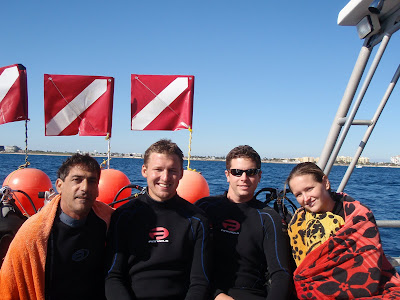
Last weekend, Mike and I took our PADI Open Water SCUBA Certification class. It consisted of a 50 question multiple choice test, a 2 hour pool period and 4 ocean dives. It was just Mike, a girl
 about our age, the instructor and myself, which made for an easy course. As we were all comfortable underwater, we were able to spend more time exploring the reefs and the wreck. On Saturday, the two dives that we did were both to a reef at a depth of about 40 feet. We saw lots of cool tropical fish and all of the coral associated with reefs. On Sunday, we dove to depths of ~80feet at the deepest and explored a 150' wreck called "Ancient Mariner" as well as a another deep reef. It is quite an incredible feeling to sit on the sandy bottom and look up and not be able to see the surface. Though we were not supposed to be deeper than 60' nor to be swimming around inside the wreck, our instructor felt that we were competent enough and let us do both. At the wreck, we saw a few lobster, a wide variety of fish and an enormous manta ray. It was about 6 feet in diameter and casually swimming around the wreck. The 4 dives were anywhere between 25 and 45 minutes depending on our depth because one uses compressed air faster when one is deeper because the air is more compressed.
about our age, the instructor and myself, which made for an easy course. As we were all comfortable underwater, we were able to spend more time exploring the reefs and the wreck. On Saturday, the two dives that we did were both to a reef at a depth of about 40 feet. We saw lots of cool tropical fish and all of the coral associated with reefs. On Sunday, we dove to depths of ~80feet at the deepest and explored a 150' wreck called "Ancient Mariner" as well as a another deep reef. It is quite an incredible feeling to sit on the sandy bottom and look up and not be able to see the surface. Though we were not supposed to be deeper than 60' nor to be swimming around inside the wreck, our instructor felt that we were competent enough and let us do both. At the wreck, we saw a few lobster, a wide variety of fish and an enormous manta ray. It was about 6 feet in diameter and casually swimming around the wreck. The 4 dives were anywhere between 25 and 45 minutes depending on our depth because one uses compressed air faster when one is deeper because the air is more compressed.Speaking of which, an interesting thing happened when we were preforming out last decompression stop of the weekend. A decompression stop is pausing for a few minutes while ascending to allow some of the dissolved nitrogen escape from the blood stream. If this is not done, a painful condition called decompression sickness "the bends" could result. Throughout the weekend, the instructor had told us to let him know whenever our pressure gauges read less than 500 psi. Once mine dropped below, I showed it to him and he gave me the universal "OK" signal. We kept exploring the reef. At this point, I was not concerned because he was not concerned, and I figured that as it was a class, they would provide a much larger window than necessary in order to get to the surface. In another minute or so we begin ascending. I'm checking my gauge which is reading about 300 psi. Because we are coming from around 70 feet, we are slowly ascending to prevent the bends. I am occasionally glancing at my gauge, which is steadily declining over the next 5 minutes. We get to about 20 feet below the surface and the instructor indicates that we will begin our 3 minute decompression stop. At this point, I am looking at my gauge, which says about 50psi, and wondering if I have 3 minutes of air. I wasn't too worried because I felt like in an emergency, I could swim to the surface. Also, I felt like the gauge could work like a gas tank gauge in that one can get by for quite a while while on empty. Anyone that knows me well knows that this is a silly thing for me of all people to think as I have tested that particular gauge many times with unlucky results. Just after we begin the stop, I notice it becomes hard to breathe. Each breath becomes more and more difficult to draw until finally, there is definitely no more air in my tank. Uh oh. Luckily, we were all close to one another, so I reached over for the secondary air source on my instructor's tank and was able to breathe again. Though it was never that scary, it is a bit unnerving to run out of air. It was a good learning experience and will be the last time that I let such a thing happen.


3 comments:
The family will miss your smiling face at the dinner table on Thursday. But, trust me, most of us would rather be where YOU are!
Love and hugs, mom
great blogs!
Glad you guys are doin stuff. I got the chance to meet Michael and Beth the other day. They are now living in Fort Collins. Michael is a funny guy. Sorry you are going to miss Dorothy's cooking for thanksgiving. Come on out here when you get some time.
So the second i read that hashing entry I googled for a SLC group...thank goodness some people drink in this town
Post a Comment